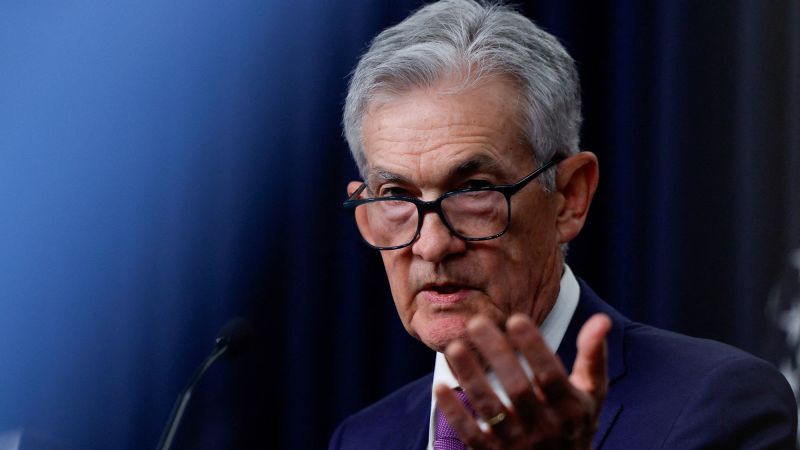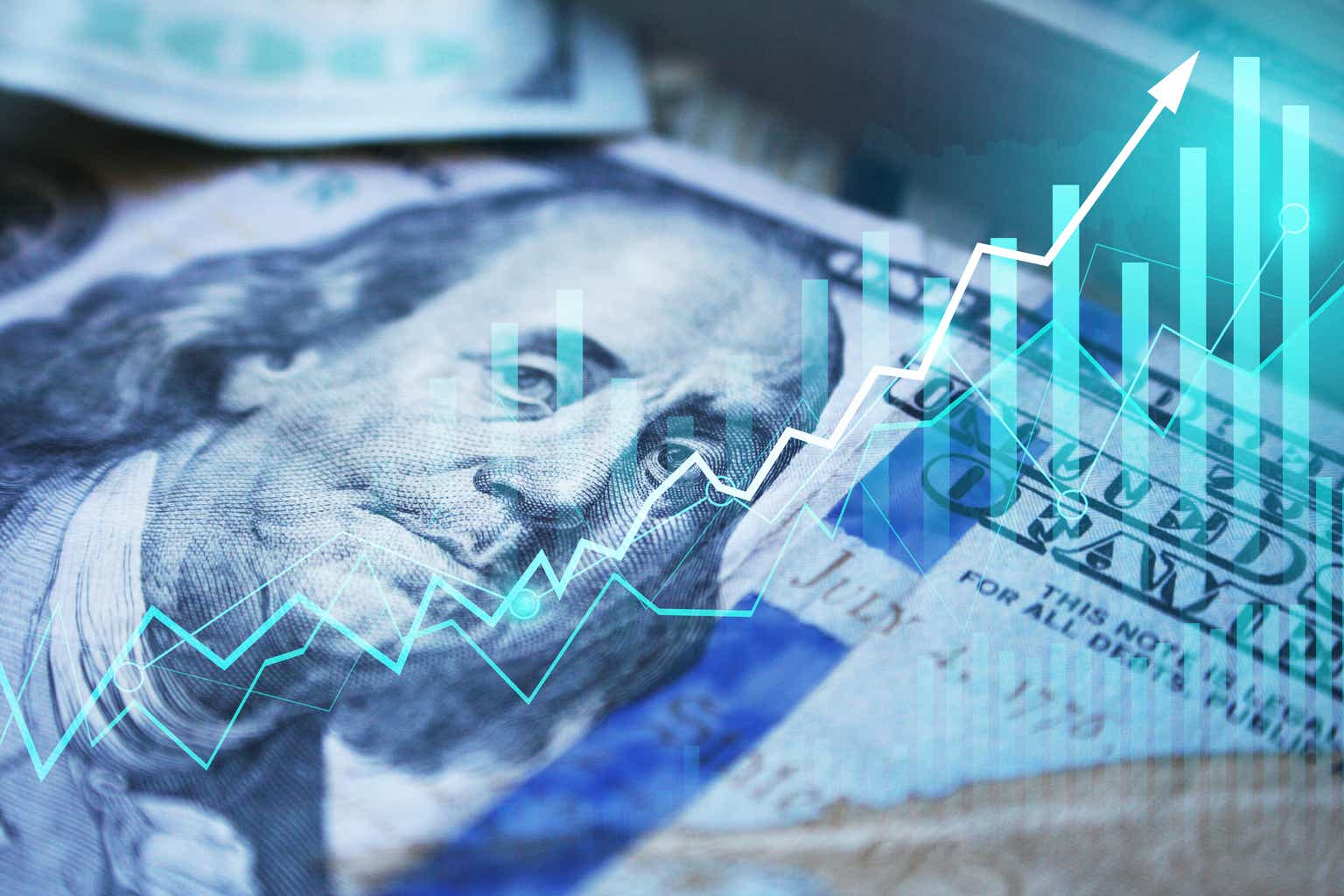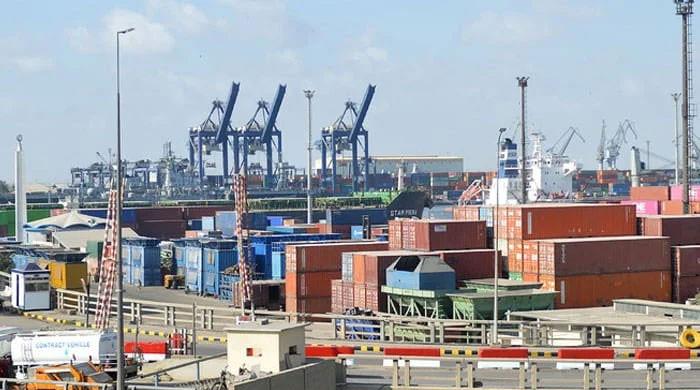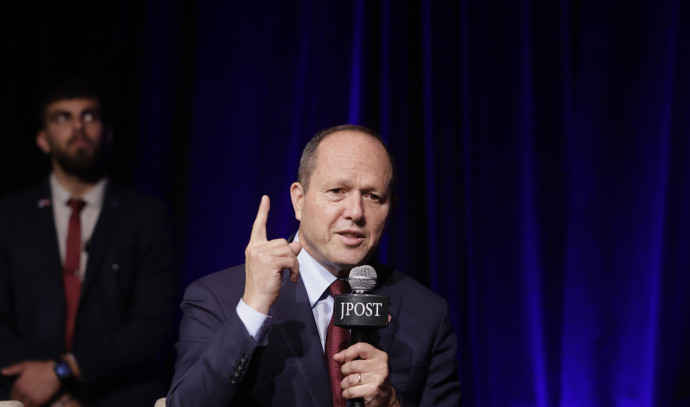The Federal Reserve's plans to cut interest rates in 2024 have been delayed as inflation remains high and the economy continues to grow, leading economists to believe that rates will stay higher for longer.

Despite initial expectations of rate cuts by the Federal Reserve this year, economists now believe that interest rates will remain unchanged due to a growing economy and increasing inflation.

The Apollo Management Chief Economist predicts that the US Federal Reserve will not cut interest rates in 2024 due to an accelerating economy and rising inflation, indicating that yield levels in fixed income will remain high.

India's per capita disposable income is projected to be ₹2.14 lakh in 2023-24, higher than the earlier estimate of ₹2.12 lakh, according to the government's correction to GDP data, which also shows an 8% growth in FY24 and 13.3% in the previous year.

Federal Reserve Bank of Atlanta President Raphael Bostic wants to wait for further evidence of receding inflation before considering interest rate cuts to avoid potential reversals in policy, indicating a cautious stance among Fed officials.

California's economy is being negatively impacted by high unemployment rates, with layoffs in the tech industry, fallout from Hollywood strikes, and an increase in rural joblessness adding to the challenges the state faces.

Maryland has signed a contract with Motorola to create a text-message alert system for the grounds of the Capitol, following a recent lockdown due to an anonymous phone threat. The CDC has revised its guidance on COVID-19, stating that Americans who test positive no longer need to stay in isolation for five days if their symptoms are mild and improving and they've been fever-free for at least one day. President Joe Biden and former President Donald Trump will face voters on the Texas primary ballot, highlighting the ongoing clash between the Biden administration and the state over illegal border crossings. Iran began voting in its first parliamentary elections since mass 2022 protests, raising questions about voter turnout. The Body Shop Canada has filed for bankruptcy protection, announcing the closure of 33 stores and the cessation of its e-commerce operations as part of its restructuring plans. Former prime minister Brian Mulroney has died at the age of 84, leading former Newfoundland and Labrador premier Clyde Wells to praise him for his leadership and success in free trade. North York General Hospital in Canada has opened a new mental health zone in its emergency department, aiming to provide a safe space for patients in a mental health crisis. Argentine President Javier Milei plans to resubmit his shelved reform package to the country's congress in late 2025, following midterm elections that he expects will increase his party's representation. A shadow group of anti-government operatives in Belarus called BYPOL is planning a coup against President Alexander Lukashenko. The Alberta budget has proposed a tax on electric vehicles and a new property levy, emphasizing spending restraint in light of lower resource revenues and economic uncertainties.

Inflation in the European economy eased in February to 2.6%, as high interest rates, moderating oil and gas prices, and sluggish growth contributed to lower price increases in stores, bringing the European Central Bank closer to its goal of 2% inflation.

US Treasury Secretary Janet Yellen praised Chile during a visit aimed at strengthening ties and reducing dependence on China for critical minerals, particularly lithium, which is essential for the production of electric vehicle batteries. Yellen highlighted the opportunities for American companies to invest and integrate supply chains with Chile.

Investors may need to revise their expectations of interest rate cuts by the Federal Reserve in 2024 to zero, as the US economy shows no signs of slowing down and the Fed's pivot has fueled growth, according to economist Torsten Slok of Apollo Global Management. Higher interest rates could pose a challenge for stocks, as they could undermine stretched equity valuations.

Germany's ruling coalition is working on a stimulus package worth around €7 billion ($7.6 billion) in an attempt to revive the country's struggling economy, with the aim of securing parliamentary approval before the summer break.

Despite the recent exodus of companies from Nigeria, South African billionaire Christo Wiese believes that the country's large and growing population makes it an attractive investment hub that big players will eventually re-enter.
China Vice President Vows More Openness to Foreign Firms Amid Efforts to Restore Economic Confidence
Chinese Vice President Han Zheng has pledged to provide more opportunities for foreign companies in China, emphasizing the government's commitment to opening up more industries to foreign investment.
G20 finance officials have discussed the possibility of implementing a global minimum tax on billionaires to address issues of tax evasion and wealth inequality, with the EU Tax Observatory proposing a minimum 2% tax on billionaires' net wealth that could generate $250 billion annually. However, implementing such a tax may be challenging due to the mobility of wealthy individuals and the complexity of harmonizing international tax systems.

Cuba has implemented a significant increase in fuel prices in an effort to address the country's economic crisis, causing concern among residents about the impact on their budgets and livelihoods.

Mortgage rates climbed this week, with the 30-year fixed-rate mortgage reaching 6.94%, while home sales decreased in response to rising rates and high homeowners insurance rates are driving prospective buyers away in certain states.

The US economy's re-acceleration and rise in underlying inflation will prevent the Federal Reserve from cutting interest rates in 2024, according to Apollo Management Chief Economist Torsten Slok.

The University of Michigan's Consumer Sentiment reading for February fell to 76.9, lower than expected, indicating a slip in consumer sentiment and expectations for inflation to rise.
China is the only major economy experiencing deflation, with consumer prices dropping 0.8% in January, due to a real estate crisis and overall economic decline, leading to negative impacts on household incomes, corporate earnings, and government taxes.
Construction spending in the US fell 0.2% in January, the first decline since December 2022, as companies and the government reduced projects due to high interest rates.

Bank of America economist Stephen Juneau agrees with Cleveland Fed President Loretta Mester's prediction of three rate cuts in 2024, citing the ongoing disinflation in areas such as used cars, apparel, and home furnishings and the potential for a gradual cutting cycle by the Federal Reserve.
Consumer sentiment slipped in late February but remained at a 32-month high, indicating optimism about the U.S. economy despite some decline in expectations for the future.

U.S. manufacturing showed signs of rebounding in February despite a decline in factory employment, with customer inventories declining for a third straight month and manufacturers reporting positive comments on increased demand.

The past 14 years have been marked by economic challenges and underperformance in the UK, with low growth, austerity measures, and widening inequalities, causing voter discontent and a difficult legacy for the current Conservative government to address.

Despite the attractive job prospects, stable employment, and higher salaries in Singapore, Malaysia is facing a brain drain as skilled workers continue to leave the country, posing potential long-term implications for both Malaysia's economy and Singapore's intertwined economy. To address this issue, Malaysia needs to adopt a "brain circulation" concept that encourages skilled workers to eventually return and contribute their expertise to the country, while also focusing on political stability, reducing the pay gap, and investing in infrastructure to incentivize the Malaysian diaspora to come back.

The gold market holds above $2,050 an ounce despite weaker than expected U.S. manufacturing data, as it struggles to attract significant buying.

Millennials are on track to become the wealthiest generation in history, as they are set to inherit $90 trillion of assets over the next twenty years, but this wealth transfer will likely deepen wealth inequality as it mostly benefits those from affluent families.

Spam, the tinned meat brand owned by Hormel Foods, is expected to thrive in an inflation-hit economy as consumers turn to affordable protein sources amidst rising food prices, according to CEO Jim Snee. Hormel's strong Q1 2024 earnings results reflect consumer loyalty to the Spam brand, offering growth opportunities in the coming months. Snee also dismisses concerns about weight-loss drugs impacting food sales, highlighting the balance and variety in Hormel's protein portfolio.

Many young people in America are experiencing economic despair and are considering leaving the country due to high costs of living, long working hours, and limited job opportunities for the younger generation.

Americans are experiencing high grocery prices, with a surge of more than 21% since the start of 2021, outpacing overall inflation, and experts say relief is unlikely to come soon. Low-income households are disproportionately affected, spending about 30% of their income on food, and President Biden's claim of a booming economy is being questioned. Various factors are contributing to rising food prices, including supply chain issues and increased wages for food service workers. The Federal Reserve predicts that high prices could persist unless there is a severe recession.

China's manufacturing industry showed mixed signals in February, with the official Purchasing Managers' Index (PMI) indicating contraction while the Caixin manufacturing PMI showed expansion, fueling calls for Beijing to boost economic growth.

China's manufacturing industry showed mixed signals in February, with the official Purchasing Managers' Index (PMI) indicating contraction while the Caixin manufacturing PMI, which focuses on private companies, showed expansion, fueling calls for Beijing to boost growth ahead of a key meeting of the country's leaders.

Eurozone inflation continues to ease, with consumer prices rising at an annual rate of 2.6 percent in February, down from 2.8 percent in January, prompting possibilities of interest rate reductions.

UK house prices have risen by 1.2% in February compared to a year ago, according to Nationwide, signaling signs of activity in the housing market, though uncertainty remains due to future interest rate uncertainties and prices remaining below their peak.

Grocery products are shrinking in size while maintaining the same price, a phenomenon known as shrinkflation, which is often not reflected in inflation data.

If Donald Trump were to be re-elected and seek to repeal the Inflation Reduction Act (IRA), Texas and other Republican states would lose billions of dollars of investment in their economy, potentially benefiting foreign countries like China and keeping domestic fossil fuel prices higher, according to experts.

Core services inflation, which excludes energy services, spiked to 7.15% annualized in January, the highest month-to-month jump in 22 years, according to the Bureau of Economic Analysis, prompting the Fed to take a wait-and-see approach before cutting rates.

China's rapid urbanization has created a dilemma for rural residents who are faced with the choice of staying in under-resourced villages or moving to cities with limited job opportunities, hindering the country's plans for rural revitalization and exacerbating the lifestyle gap. This has led to pressing issues such as insufficient elderly care, rising divorce rates, and declining fertility, posing challenges to China's demographic outlook.

An elderly homeowner in Las Vegas warns consumers about unlicensed contractors after being scammed out of over $8,000 for a job that remains unfinished and of poor quality.

The tax burden on the middle class varies across the EU, with the UK middle class facing economic struggles despite earning up to £60,000 annually, and Luxembourg having the highest disposable income for the middle class in 2019, according to a report by EconPol Forum.

The transfer of wealth from the Baby Boomer generation to Millennials and Generation-Z in the United States over the next 20 years is expected to make them the wealthiest generation in American history, providing financial security and opening doors for homeownership, debt-free living, and more career opportunities.

Pakistan's new government must address economic challenges while also ensuring the safety and security of society, as recent incidents of religious extremism highlight the need for societal stability.

India remains the world's fastest-growing major economy, with a 8.4% expansion in the last quarter of 2023, led by strong performance in manufacturing and private consumption, as the country sets to hold a general election; India is projected to become the world's third largest economy, surpassing Japan and Germany in the coming years.

China's funding costs are declining as the government aims to boost consumer and business spending, leading to concerns about the effectiveness of monetary policy and the potential for a liquidity trap.

Federal Reserve Bank of New York President John Williams reiterated that the next move for the U.S. central bank is likely to be a cut to its interest rate target, citing lower inflation and a more balanced economy.

China's Jiangsu province has become the first to invite foreign businesses to participate in its strategic industrial chains, as part of the country's efforts to attract and retain foreign investors, but concerns over long-term viability arise amidst geopolitical tensions.

Xi Jinping's efforts to shift China's economy away from debt-driven growth and towards sustainability is facing resistance as economic protests and discontent rise due to a prolonged economic slowdown, a real estate crisis, and drops in wages among civil servants; the lack of a clear roadmap and effective communication by Xi also adds to the dissatisfaction, posing challenges to his leadership.

The Israeli government has introduced a new "Black Sticker Law" that affixes black stickers to products that have raised their prices during wartime without government approval, as part of consumer protection regulations.

Americans' decrease in saving and increase in spending is expected to taper off in 2024, potentially leading to weaker consumer spending and a more vulnerable economy, as more households aim to build up their cash reserves and retirements increase; however, economists do not forecast a recession as long as incomes and job growth remain sturdy.

Brazil's finance minister has called for a global tax on the super-rich to combat tax evasion and contribute to sustainable development, but acknowledges that achieving consensus on the issue will be challenging.